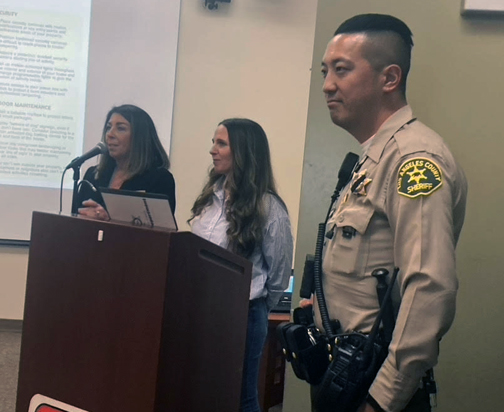
Photo by Mikaela STONE
By Mikaela STONE
In light of recent home burglaries, on May 8 at the La Crescenta Library Los Angeles County Sheriff Dept. Special Assignment Officer Chun of the Crescenta Valley Station offered crime prevention tips and advice on how to start a Neighborhood Watch program.
While individual safety is important, the best way to prevent crime is having neighbors looking out for one another, just as the best way to spread safety information is through word of mouth.
The majority of recent break-ins have involved a burglar entering into a property’s backyard, opening or smashing out the glass of the backdoor and reaching through to the latch. Typically, once inside the individual/s will hurry to the master bedroom looking for valuables left in plain view. Because this method relies on working quickly before a neighbor can report the sound of breaking glass or suspicious movements inside the residence, measures that slow a potential perpetrator are effective in dissuading a thief who is making plans. Removing exposed ladders and securing climbable outside furniture to prevent easy access to the second floor, inserting a bar or rod into the track of a sliding glass door, hanging a “Beware of Dog” sign, regardless of dog ownership, putting valuables in less obvious places and placing security cameras in the rear entrance to the backyard as well as the front yard are all methods of slowing the pace of a burglar.
As most break-ins occur when the residents are not home, Chun recommended several safeguards including having an alarm system hard wired to the internet router, which is more difficult to disable than a system that relies on Wi-Fi. While many security systems store a reserve of power to alert a homeowner of a power shut off, locking the home’s breaker box is a way to ensure that the power is not tampered with. Some alarm systems have glass break sensors, which Chun encouraged, because the modus operandi at most recent break-ins have been to break glass panels rather than the doors.
The most important part of investing in these electronics, however, is using them, Chun said.
He said to always turn systems on, even when leaving for a short amount of time. Law enforcement will err on the side of caution and respond to calls unless the alarm is being tripped constantly. Even if an alarm has been falsely triggered 19 times, law enforcement does not want to risk something happening on the 20th time, Chun said.
To prevent trespassers while on vacation, there are appliances that mimic the TV being on. Leaving the radio on, closing the blinds and asking a neighbor to pick up residents’ mail will also buy time – time that a potential burglar must spend trying to ensure that the homeowner is actually absent.
LASD/CV Station and Glendale Police Dept. also offer free vacation checks for homeowners. Volunteers or officers will drive by a home to do a simple check. However, this service is not a substitute for knowing your neighbors, Chun added.
Chun noted that residents will know the “vibe” of their own community and are therefore more likely to notice something amiss, even if it’s subtle.
Chun described neighbors as the eyes and ears of residential areas.
“If you do not know your next door neighbor, how would they know when that neighbor might need them?” Chun asked.
Should one suspect a break-in in their own home or a neighbor’s home, law enforcement encourages them not to enter the residence and instead call the CV Sheriff’s Station from elsewhere. Entering is not worth the risk of potentially interrupting something occurring within. Chun reminded the audience that 9-1-1 is for emergency calls and non-life threatening questions or suspicions may be directed to (818) 248-3464.
The Neighborhood Watch program is best suited for 10 to 15 neighbors living on the same block. Those interested are encouraged to hold a meeting and invite a member of local law enforcement to attend. That member will be able to guide and answer specific questions concerning the program and the neighborhood.
A block captain, or the community liaison between neighbors and law enforcement, will collect and distribute information so that each member of the community may get in touch with one another should suspicious behavior be witnessed. Even if residents are not a part of a formal Neighborhood Watch program, being educated on safety tips and surrounding oneself with trustworthy neighbors is an important part of keeping the area crime-free.
